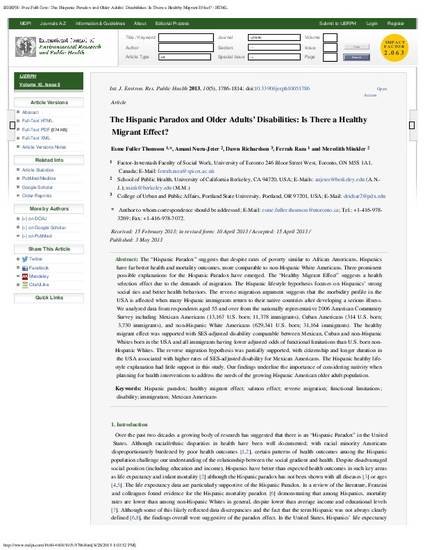
- Hispanic Americans -- Health and hygeine,
- Immigrants -- United States -- Social conditions,
- Older people with disabilities -- United States
The “Hispanic Paradox” suggests that despite rates of poverty similar to African Americans, Hispanics have far better health and mortality outcomes, more comparable to non-Hispanic White Americans. Three prominent possible explanations for the Hispanic Paradox have emerged. The “Healthy Migrant Effect” suggests a health selection effect due to the demands of migration. The Hispanic lifestyle hypothesis focuses on Hispanics’ strong social ties and better health behaviors. The reverse migration argument suggests that the morbidity profile in the USA is affected when many Hispanic immigrants return to their native countries after developing a serious illness. We analyzed data from respondents aged 55 and over from the nationally representative 2006 American Community Survey including Mexican Americans (13,167 U.S. born; 11,378 immigrants), Cuban Americans (314 U.S. born; 3,730 immigrants), and non-Hispanic White Americans (629,341 U.S. born; 31,164 immigrants). The healthy migrant effect was supported with SES-adjusted disability comparable between Mexican, Cuban and non-Hispanic Whites born in the USA and all immigrants having lower adjusted odds of functional limitations than U.S. born non-Hispanic Whites. The reverse migration hypothesis was partially supported, with citizenship and longer duration in the USA associated with higher rates of SES-adjusted disability for Mexican Americans. The Hispanic healthy life-style explanation had little support in this study. Our findings underline the importance of considering nativity when planning for health interventions to address the needs of the growing Hispanic American older adult population.

© 2015 by the authors; licensee MDPI, Basel, Switzerland. This article is an open access article distributed under the terms and conditions of the Creative Commons Attribution License (http://creativecommons.org/licenses/by/4.0/).